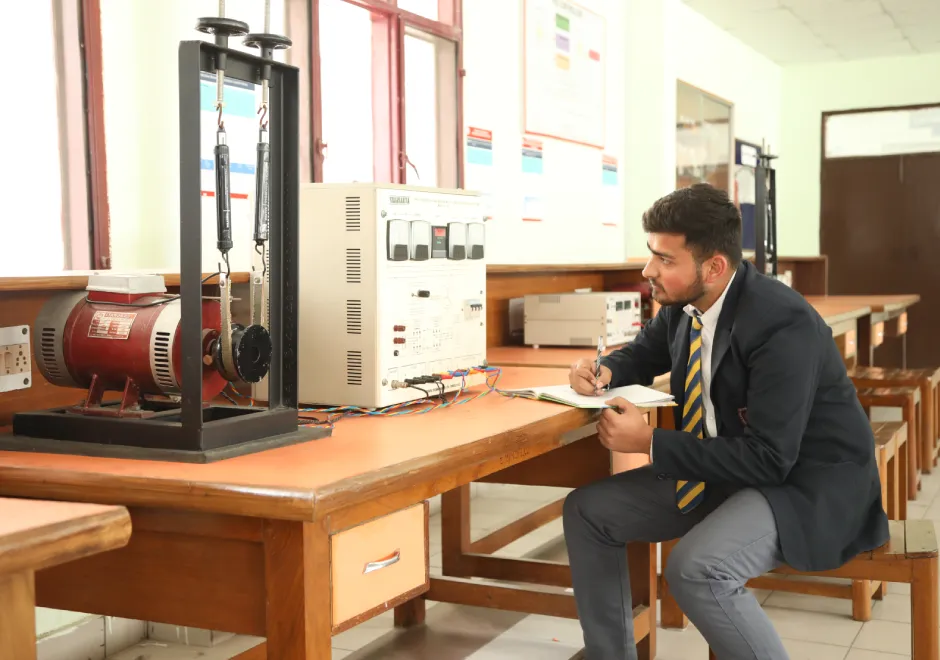
Master of Technology in Electric Vehicles Technology
Department of Electrical And Electronics Engineering
Duration
2 Years
Eligibility Criteria
Passed Bachelor’s Degree or equivalent in the relevant field. Obtained at least 50% marks (45% marks in case of candidates belonging to reserved category) in the qualifying examination.

The Department of Electrical and Electronics Engineering is a center of innovation for electrical systems and electronics, offering a dynamic learning environment that cultivates creativity and problem-solving skills.
M. Tech in Electrical Vehicles Technology is a postgraduate course specifically focused on the design, development and improvement of sustainable transportation systems. The curriculum provides an in-depth understanding of electric propulsion, battery control systems, charging stations, power electronics and hybrid cars. The participants gain hands-on knowledge about new emerging EV technologies through in-the-field training in high-tech laboratories and through engaging in industry-focused projects. This programme equally focuses on technical quality and on environmental, economic, and societal aspects of clean mobility and prepares graduates to take up influential roles in research, automotive, energy, and academic fields.
Apply NowAdmissions 2026
Find your path to Success
Program Outcomes POs
-
PO1
Engineering Knowledge: Apply the knowledge of mathematics, science, engineering fundamentals, and an engineering specialization to the solution of complex engineering problems.
-
PO2
Problem Analysis: Identify, formulate, review research literature, and analyze complex engineering problems reaching substantiated conclusions using first principles of mathematics, natural sciences, and engineering sciences.
-
PO3
Design/development of solutions: Design solutions for complex engineering problems and design system components or processes that meet the specified needs with appropriate consideration for the public health and safety, and the cultural, societal, and environmental considerations.
-
PO4
Conduct investigations of complex problems: Use research-based knowledge and research methods including design of experiments, analysis and interpretation of data, and synthesis of the information to provide valid conclusions.
-
PO5
Modern tool usage: Create, select, and apply appropriate techniques, resources, and modern engineering and IT tools including prediction and modelling to complex engineering activities with an understanding of the limitations.
-
PO6
The engineer and society: Apply reasoning informed by the contextual knowledge to assess societal, health, safety, legal and cultural issues and the consequent responsibilities relevant to the professional engineering practice.
-
PO7
Ethics: Apply ethical principles and commit to professional ethics and responsibilities and norms of the engineering practice.
-
PO8
Individual and team work: Function effectively as an individual, and as a member or leader in diverse teams, and in multidisciplinary settings.
-
PO9
Project management and finance: Demonstrate knowledge and understanding of the engineering and management principles and apply these to one’s own work, as a member and leader in a team, to manage projects and in multidisciplinary environments.
-
PO10
Life-long learning: Recognize the need for, and have the preparation and ability to engage in independent and life-long learning in the broadest context of technological change.
Program Educational Objectives PEOS
-
PEO1
To build the soundest professional career and/or be capable enough to further acquire higher education by attaining sufficient knowledge, understanding, and practical skills in the domain.
-
PEO2
To comprise exemplary attitude, communication skills, teamwork, and administration in their occupation and adjust to lifelong learning.
-
PEO3
To includes vast academic and experimental knowledge of fundamentals to enable them to use it to expand the enterprise and community in general.









